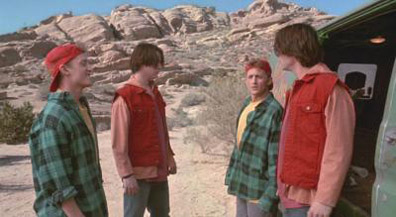|
|
Chapter TwoBill and Harold and Cheech and Ted and Kumar and ChongBy Brett Ballard-BeachNovember 10, 2011
Guantanamo Bay is an equal opportunity offender in the Blazing Saddles tradition. It parades a litany of stereotypes, behaviors, attitudes, and assumptions across the screen to first shock us, then debunk and ridicule them. An extended sequence featuring Jon Heep and Missi Pyle as an Alabama backwoods husband and wife illustrates the movie’s philosophy concisely. He is a hunter who inadvertently sends a cute little deer’s brains in a projectile all over Harold’s face. Making amends, he takes them back to his decrepit cabin in the woods. The duo fear for the worst, but the inside is straight out of IKEA or Crate & Barrel. The hunter and his woman talk like hicks but are evidently smart. Harold & Kumar joke about the perception that since they live in the woods in the South, they must be a pair of in-breeders with a bastard child. The husband and wife are offended. Apologies are offered, good weed is smoked, but the kicker is - they really are brother and sister with a one-eyed freak chained up in the basement. I can’t do the eight-to-ten minute sequence justice with the description, but hopefully that summary conveys the film’s strategy of embracing crude stereotypes only to upend and subvert them, then find a way back to outrage with a comic kicker. It might be considered hypocritical, except the hypocrisy is the set-up and the punchline. However, the film’s true impact lies in its near novelty status as one of the only American works of art in the post 9/11 era to express any kind of despair over the freedoms we gave up and the insanity we as a nation plunged into in the name of protecting us from those who would harm us. Hayden and Schlossberg find just the right visual metaphor to sum this up when they have a blithely racist and stupid Homeland Security agent (played by Rob Corddry) wipe his ass with the Bill of Rights and then toss it, skidmarks and all, at a suspect he is interrogating. For most of its running time (quite epic for the genre at 108 minutes, and nearly 20 minutes longer than either the first or third film), Guantanamo Bay finds a way to balance the political with the personal and keep the laughs up front. The momentum lags in the final third but this is compensated for with the film’s version of a deus ex machina (a deus ex toking-a, if you will), one with access to the finest weed available and the ability to issue a presidential pardon. In a world gone mad, the film argues, sometimes your only recourse against insanity is to settle down on the couch, kick your feet up, and puff, puff, give, even if it is with the Commander-in-Chief. Next time: the first of three year-end Chapter Two extravaganzas kicks off as wizards take on wookiees. It’s Harry Potter and the Chamber of Secrets vs. The Empire Strike Back .
|

|
|
|

|
Friday, November 1, 2024
© 2024 Box Office Prophets, a division of One Of Us, Inc.


